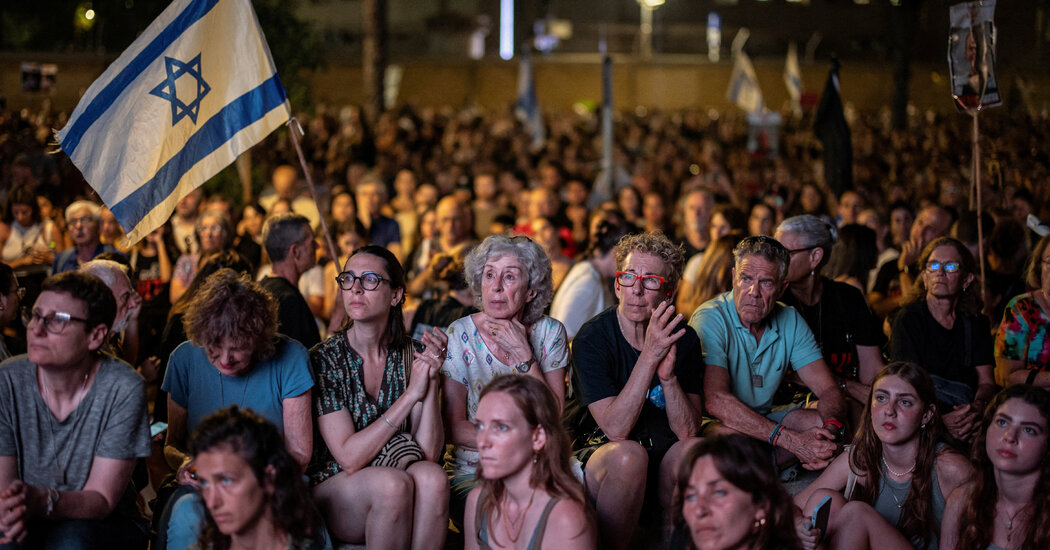The Israeli operation to rescue four hostages in the town of Nuseirat in central Gaza on Saturday unleashed a heavy aerial bombardment and ground operations that killed more than 200 people, according to two hospital officials in the area.
Residents there said it was the heaviest onslaught they could recall during the eight-month-old war. One hospital official said Israel struck a busy market, and video footage from the immediate aftermath of the attack showed bloodied bodies on the ground in what appeared to be a market that was struck.
Other video footage showed people running for cover as a powerful airstrike exploded near them.
Dr. Khalil Daqran, the spokesman for Al-Aqsa Martyrs Hospital in nearby Deir al-Balah, and Marwan Abu Nasser, the acting administrative director of Al-Awda hospital in Nuseirat, said their two hospitals had received a total of more than 200 dead and many of the wounded from the attack on Saturday. Many of those killed were women and children, the hospital officials said.
Israel’s military spokesman, Rear Adm. Daniel Hagari, estimated the number of casualties to be under 100, without specifying whether these were dead or wounded or both.
The New York Times could not independently verify the death toll and it was not clear how many were civilians and how many were Hamas militants.
Hours later some of the dead had already been buried by their families while others had yet to be claimed, according to Dr. Daqran.
“The martyrs who have yet to be identified are still in the morgue. It is difficult to identify them,” he said. “It is difficult to identify them because some of the martyrs who arrived are nothing more than torn limbs from children and women and elderly.”
Tens of thousands of Palestinian residents of Gaza have fled to Nuseirat in recent weeks to escape Israeli bombardments in other parts of the embattled territory such as the southern city of Rafah, where Israel launched a new offensive recently.
Khaled al-Saadouni, a young man who witnessed the Israeli operation in Nuseirat, told Reuters he had seen Israeli special forces arrive in an Apache attack helicopter and he also saw a white car with Israeli forces.
“The Apache started to bomb and fire directly at people,” he said, according to Reuters, adding that there were many dead and injured. “People fled,” he said.
He said there were many displaced Palestinians sheltering in the area that came under attack.
“We brought 10 injured people in one ambulance. One of them was shot directly. We barely made it out through the alleyways,” he said.
Khitam Awad, a 35-year-old teacher, said she was at home teaching 25 young students and distributing gifts when the Israeli attack began nearby.
“We were near the strikes,” she told The New York Times. “We don’t know how we escaped unharmed.”
The strikes went on for two hours in an “insane way” and they couldn’t move from the house, she added. One of her colleagues, another teacher, later found out that two of her relatives had been killed. They huddled in one room with the students, she said, as around them homes were being struck.
“We were hearing the sound of the tanks,” Ms. Awad said. “Our nerves were frayed, we didn’t know what was happening around us, bombs and rockets and tanks.”
At Al Aqsa hospital, the wounded and bodies of those killed filled the wards and corridors, according to the Gaza Health Ministry.
“The situation is catastrophic,” Dr. Daqran said. “We don’t have enough beds for all the wounded. We have five times as many injured than we have hospital beds.”
As a result, many of the dead and wounded had to be sent to another nearby hospital, Al Awda, in Nuseirat.
“Al Awda Hospital is a maternity hospital but it has been transformed to receive the injured that we don’t have space for in Al Aqsa hospital,” he said.
Mr. Abu Nasser, the acting administrative director of Al-Awda hospital, said the medical facility’s capacity to hold bodies was limited and by the end of the day, some 100 bodies that had been brought to the hospital had been taken for burial by family members.
“We’re a small hospital,” he said. “We simply don’t have the space.”
In a news conference outside Al Aqsa hospital, Dr. Daqran called on Palestinians in Gaza to donate blood and on the international community to help Gaza’s hospitals.
The flood of victims into the hospitals came at a time when the few still functioning hospitals in Gaza are struggling to continue operating as a result of continued Israeli strikes and a lack of medicine, medical equipment and overworked generators.
Bilal Shbair contributed reporting.




















































